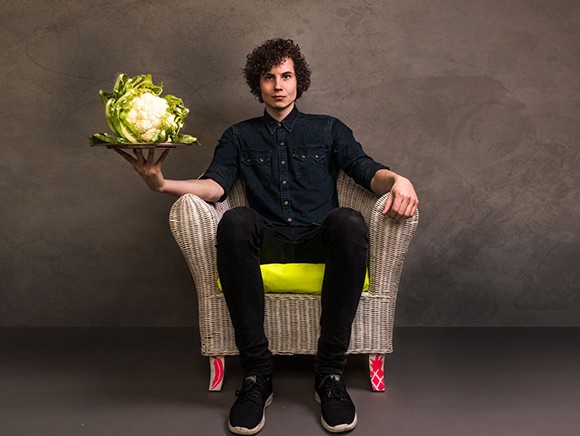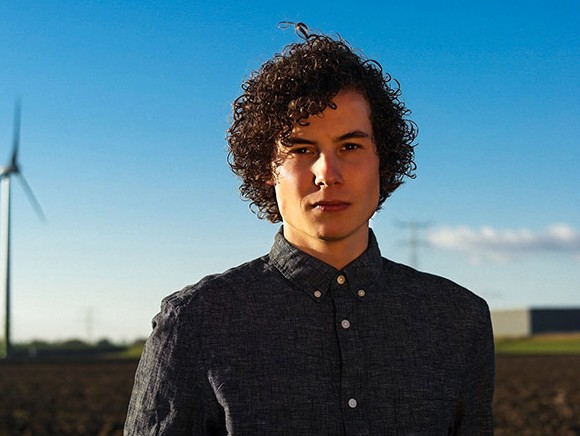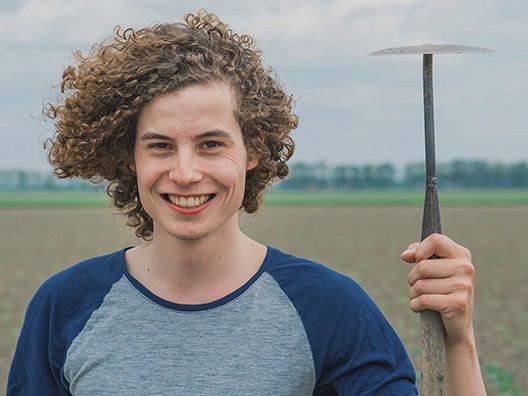
If it is necessary, they will take a stand—but never without a well-founded message. Even though its founders are leaving the nest, professionalisation at the Slow Food Youth Network (SFYN) presses on. SFYN is a having its voice heard in The Hague as well. The youth movement is all grown up.
Jorrit Kiewik: "Our goal is a good, clean, and fair food system"
Slow Food Youth Network (founded in 2009 as the Youth Food Movement) joins young food producers, consumers, farmers, cooks, and students. The movement strives for a food system that is healthier fairer. SFYN is a part of Slow Food, an international organisation created in 1989 in response to fast food, standardised flavours, and growing conformity among foodstuffs. SFYN operates in 80 countries, but only the Dutch branch has its own paid office (5 FTE). The organisation is also represented there in 13 locations and regions. "We are a grassroots organisation and we believe in change from the ground up," says Jorrit Kiewik, director of SFYN. The movement organises events such as debate series, talk shows, and free, open lunches with food saved from being wasted. An SFYN Academy was also founded, where around 25 young people each year can become more deeply acquainted with chains and systems via lectures, excursions and workshops and engage in discussion with farmers, fishers, chefs, scientists, marketers, and policy-makers. They also get to knowAnd with each other, because all participants are already active in various divisions in the food sector.
At an upstairs office in Utrecht, where the headquarters of SFYN is located, Kiewik enthusiastically tells us about the development that the movement experienced, the importance of food education, and the dairy farm in Twente where he grew up.
"Our goal is a good, clean, and fair food system. Good stands for delicious and healthy; clean for as little impact on nature, the environment, and animal welfare as possible; and fair pertains to the price for both the producer and consumer, meaning that food should be accessible for everyone. We are curious and critical, but not dogmatic, and we are always looking for future-proof solutions. We are trying to create awareness and get issues onto the agenda, particularly through setting up creative campaigns. For instance, we already supplied over 15,000 free lunches across the country using products that otherwise would have ended up in the trashrubbish. We also meet regularly with the Ministry of Agriculture, Nature, and Food Quality. We're also active in Brussels at the Slow Food lobby group. Since the Dutch SFYN division has taken the most professional approach, we have a leading role in the international youth branch. We have come a long way from the stereotype of a few hipsters who do food activism on the side."
"We are particularly known for addressing food waste and food education. With regard to education, we are trying to make it so that every child at primary school learns where food comes from and what healthy and sustainable food is by working with the government, which is different from our typical approach. I consider it our duty to ensure that this does not only happen at schools where children are dropped off by their stay-at-home mothers and the school board knows its way around a grant application, but also in less privileged areas. This is important, because children are typically eating fewer fruits and vegetables and are struggling with obesity more frequently."

Jorrit Kiewik
Jorrit Kiewik (1992) grew up on a dairy farm in Twente, where he was involved with products made on the farm, including cheese, sausage, and bread. He later did his studies in Agricultural Entrepreneurship at the Aeres University of Applied Sciences in Dronten and he worked at Het Portaal on The Milk Story, a platform that focuses on making Dutch dairy farming more sustainable. In 2016, Kiewik joined the SFYN Academy. He has been the director of SFYN since August 2016.
"Yes, by calling out issues in an original way, we are in a position to really make a change. Thanks to this, D66 (Democrats 66 - a Dutch political party) recently submitted a motion to create a vegetable garden at all primary schools. Not to mention that the Ministries of Agriculture, Nature, and Food Quality; and Health, Welfare, and Sport have begun a programme called "Jong Leren Eten" (Youth learn to eatLearning to eat young), with the goal of food education. 5.7 million euros was made available for this. It is a step in the right direction, but our work is far from finished. Partly due to our contribution, food waste has a found a solid place on the agenda. In politics and society, but also in the sector, awareness of that topic is being generated. Many former academy members are carrying our line of thinking into their current field of work. Thanks to several of them, the half-litres of energy drinks at Albert Heijn have disappeared from the shelves and Nestlé is currently number one in the field of sustainable chocolate."
"For a number of themes that we want to draw more attention to, we are hoping to set up more campaigns. One of them is the effect of our food choices on climate change. We will do this by using the international "Menu for Change" campaign. Western eating habits, which are being mimicked by countries like China, are exerting pressure on protein production. That must become more sustainable and we in the West have to take the lead. I'm also concerned about the declining number of places where food is being produced. That will not benefit biodiversity. Crops should also be able to grow in areas where they might be less profitable in terms of money, but still benefit things like local facilities, employment, and security. Pressure in the agricultural sector also really worries me. The Netherlands is the second-largest exporter of food in the world. We are proud of our food, but the justification for that pride is slipping away from us, because farmers are in dire straits. Only 10% of all Dutch farmers are under 40 years of age—the sector is ageing rapidly. One third of farmers have no successor. If the ones who provide our food are at the poverty line themselves, then the system is failing. Something must be done about it."
"By calling out issues in an original way, we are in a position to really make a change"

"Without a doubt. I have seen the joy of working be pulled out from underneath farmers, much like their wages and social support of agriculture. The image of the farmer has to be improved. So does their position in the supply chain: I consider this a personal mission of mine. Fortunately, I am also seeing people making changes everywhere in the sector. Of course, the decisions that people higher up the ladder are making have more of an impact on food-related changes. However, it is ultimately everyone's responsibility, including the consumer. “Vote with your fork,” that is a lofty expression we have at SFYN.”
Source: © Britt Pols